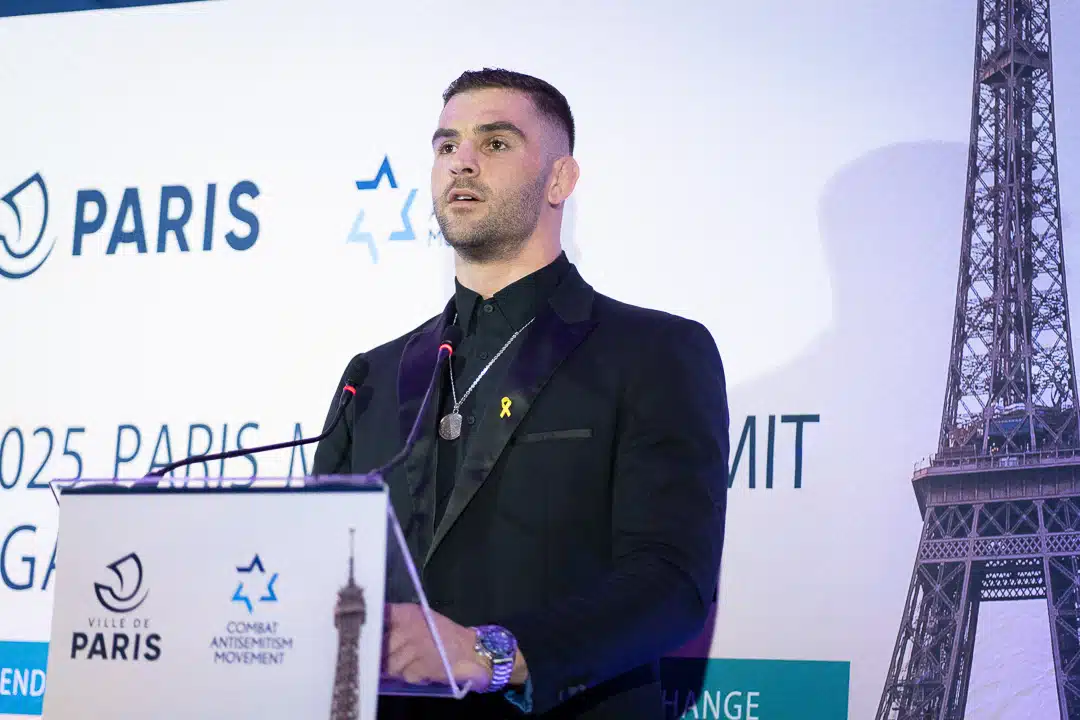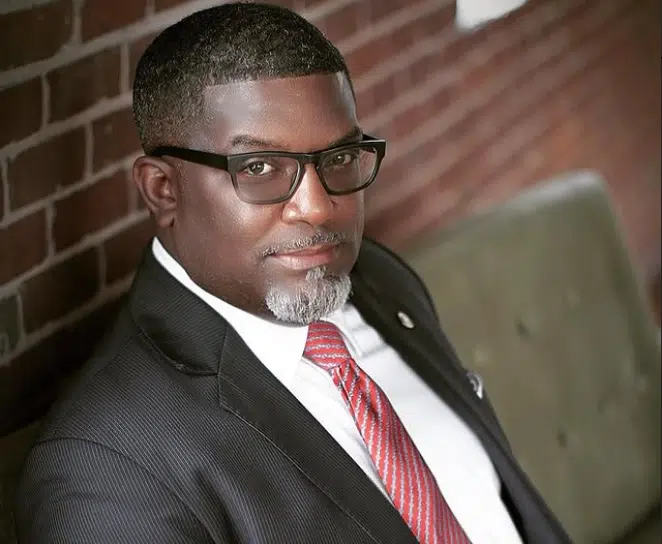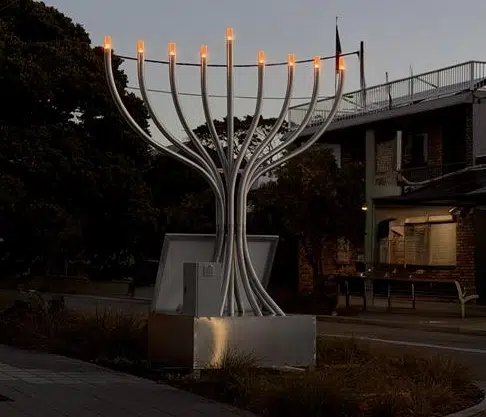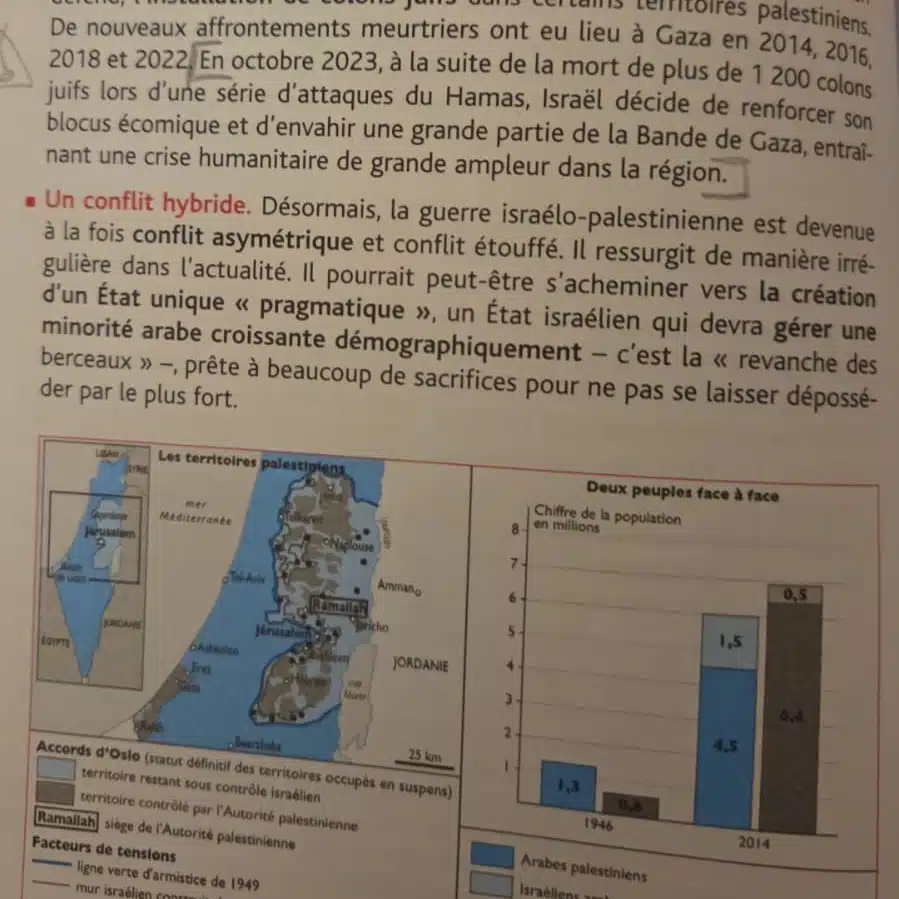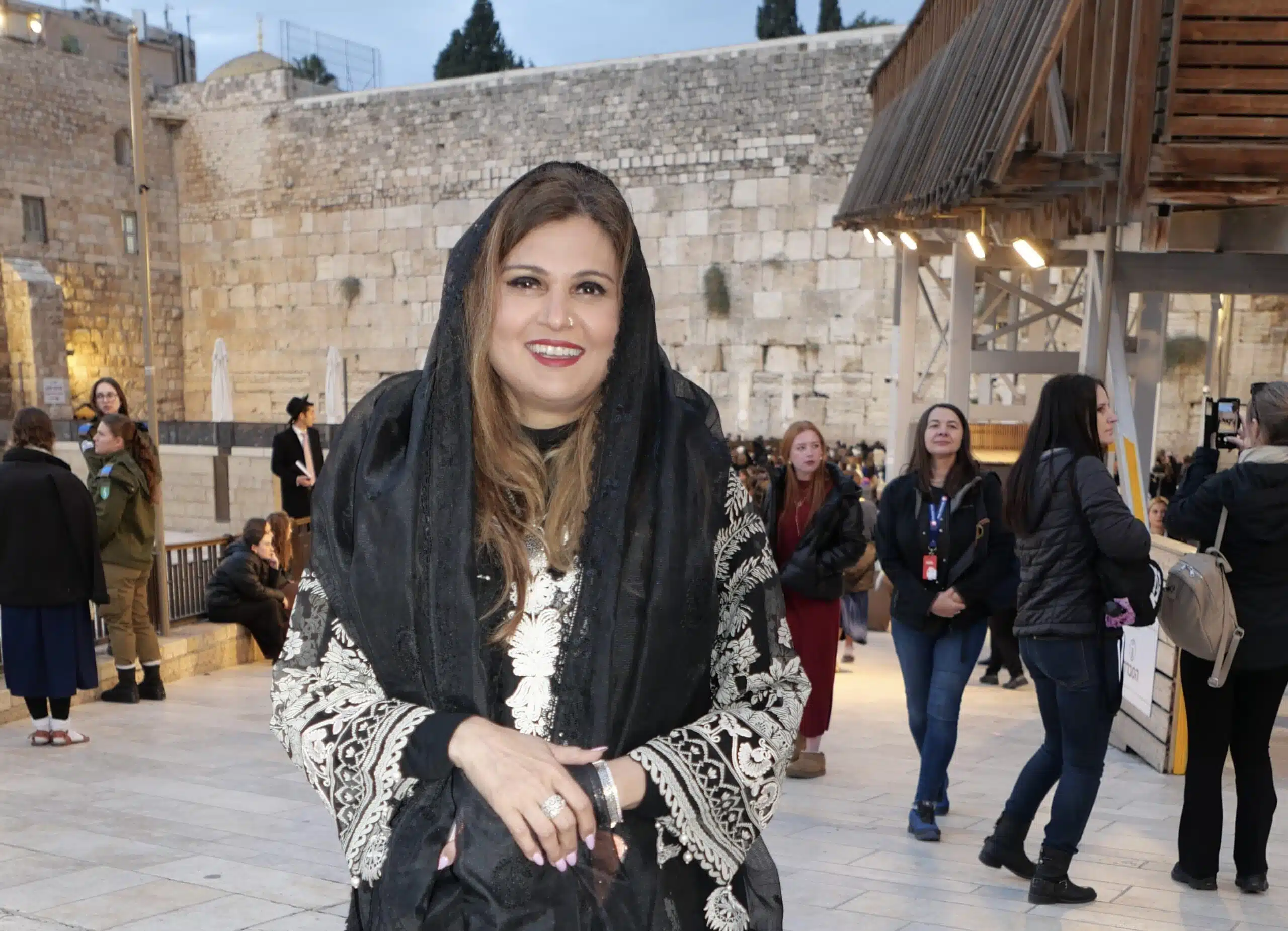
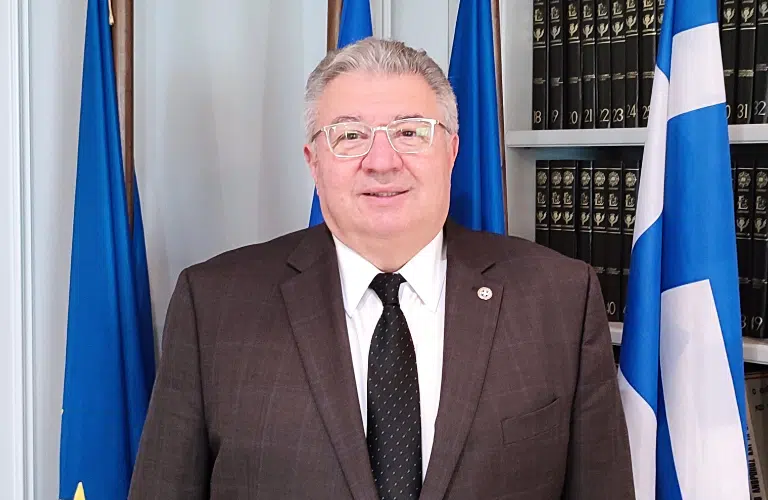
Greece Fights Antisemitism Through ‘Education and the Power of Example,’ Top Hellenic Republic Foreign Ministry Official Tells CAM
Professor Emeritus John Chrysoulakis serves as Secretary General for Greeks Abroad and Public Diplomacy of the Hellenic Republic Ministry of Foreign Affairs.
Ahead of International Holocaust Remembrance Day this past January, he participated in the “There Is Neither Greek Nor Jew” event — hosted by the Combat Antisemitism Movement (CAM) — honoring Greek “Righteous Among the Nations” heroes Loukas Karrer and Dimitrios Chrysostomos.
In 2021, Greece chaired the Presidency of the International Holocaust Remembrance Alliance (IHRA), focused on the theme of “Teaching and Learning About the Holocaust: Education for a World With No More Genocide.”
In an interview this week with CAM Editor-in-Chief Barney Breen-Portnoy, Secretary General Chrysoulakis spoke about Greece’s Jewish history, its contemporary Jewish community, its efforts to combat antisemitism, its relationship with the State of Israel, and its ties with Diaspora Jewry.
A transcript of the conversation follows:
Greece has a long and storied Jewish history going back millennia. Can you talk a bit about what Greece is doing to preserve this history and tell its story?
Jewish communities have been thriving in Greece for ages. There is evidence about the continuous existence of a Jewish community in the city of Thessaloniki even during Roman and Byzantine times. The Romaniote Jews communities in Greece are of the oldest in existence and the oldest Jewish community in Europe. Today’s Greek Jewish community, while being largely Sephardi, also has a unique Romaniote culture; it is notably present in the socio-political life of the country and also makes its presence felt in the diaspora.
The Greek state remains consistently active by making significant efforts to support the Jewish communities in their effort to tell and preserve their long and rich and painful history, through museums, monuments, events, and various initiatives of all kinds.
Particularly important in this field is the operation of the Jewish Museum of Greece, in Athens, which collects, conserves, researches, and exhibits the material evidence of 2,300 years of Jewish life in Greece. Being a historical and ethnographic museum, the focus of its attention lies in the presentation of a vivid picture of Jewish history. In Thessaloniki, the Jewish Museum of Thessaloniki, which was founded to honor the rich and creative Sephardic heritage as it evolved in the city after the 15th century, is supplemented by the Jewish History Center, which includes a specialized library with books on history and linguistics, as well as studies on the folk culture of the Jews of Greece.
Special care is taken to preserve and display the plethora of Jewish heritage sites and monuments in Greece, synagogues and cemeteries, not only in the towns and cities where there are Jewish communities today but also in places where pre-Holocaust communities no longer exist. Special and continuous care is also taken for the highlighting of the important role that Greek Jews played in Greek history through our educational system. We are proud of the inclusiveness of our textbooks in this regard.
The Greek state particularly focuses on providing Holocaust education, which is indispensable for a future with no more genocides, and teaching the new generations not only to the history of the Jewish community in Greece but also to how 90% of them died during World War II in death camps. And we keep on taking initiatives towards this aim in all given opportunities. The annual Presidency of the International Holocaust Remembrance Alliance was such an opportunity which Greece took on the 1st of April 2021 with pride and honor, as well as with a strong sense of responsibility. Inspired by the special Greek tradition in regard to the humanitarian education, the Greek Presidency of IHRA set “Teaching and Learning About the Holocaust” as its primary theme and goal.
Around 6,000 Jews live in Greece today. What is being done to protect and nurture Jewish life in contemporary Greece?
Today’s Jewish communities in Greece enjoy a high level of security and inclusivity, and they constitute a vital part of our socio-economic reality. Despite the resurgence of antisemitism in many parts of the world, in Greece, the rare incidents of antisemitic manifestations have been mainly non-violent all over the recent years. Practically, there are no incidents targeting Jews and the deplorable exceptions of antisemitic events are of low intensity, while they are treated with greater severity. For its part, the Greek state keeps on intensifying its efforts not only to suppress but mainly to prevent all kinds of intolerance against Jews, based on education and the power of example.
Relevant authorities and officials in the Greek political system are consistently expressing zero tolerance for antisemitism, including their swift response to rectify damages caused by vandalism incidents. Furthermore, protection and nurture of today’s Jewish life in Greece is an endeavor based also on the preservation and remembrance of the Jewish communities’ history in Greece, to which I have already referred extensively.
Last year, Greece chaired the Presidency of the International Holocaust Remembrance Alliance. Can you share with us what steps Greece is taking to fight rising antisemitism, both at home and abroad?
The assumption of the annual Presidency of the International Holocaust Remembrance Alliance in Aprıl 2021 was a top manifestation of the ongoing effort and devotion of Greece to the collective fight against antisemitism. As I have already mentioned, the Greek Presidency of the IHRA set “Teaching and Learning about the Holocaust” as its primary theme and goal; it was the main thread running through our Presidency, thus expressing our strong belief that educating the younger generations based on the principles and values of tolerance and anti-discrimination, while also keeping the historical memory alive, constitutes the main weapon in the fight for a world where the “Never Again” motto will become true.
During our Presidency of the IHRA, the initiatives that the Greek state continuously takes in the educational field, leveraged by the fruitful and productive cooperation between the Greek Ministry of Education and Jewish organizations, intensified and stood out. Our Holocaust education program became more formalized into a pillar program of Greek state policy determined to fight racism and antisemitism.
Furthermore, it should be underlined that Greece has been the first EU state to adopt, in November 2019, and translate into law, IHRA’s Working Definition on Antisemitism and on Holocaust Denial and Distortion: a non-legally binding statement on what antisemitism is which was adopted by the IHRA Plenary in May 2016 and, since then, it constitutes an essential tool of paramount importance in the fight against the dangers of antisemitism, blind nationalism, and fragile democracy.
This was preceded by the adoption of the antiracism law by the Greek Parliament in September 2014, as part of the crackdown on the Golden Dawn, the Greek neo-Nazi party; the Law 4285/2014 for the first time explicitly prohibits denial or trivialization of crimes such as the Holocaust. And this groundbreaking law was not only enacted, but also applied, offering an exemplary best practice of fighting antisemitism by means of a consistent legal framework.
Our Presıdency of the IHRA brought Greece to the forefront of the states that fight antisemitism and have a decisive say in the preparation and implementation of legislative and educational initiatives to combat it. Having already accumulated experience in these fields, we deployed our Presidency to share this experience with others and especially with our friends and neighbors by organizing focused informative webinars, like the webinar “Practical implementation of the three non-legally binding IHRA working definitions in multicultural societies: lessons learned, best practices, steps forward,” co-organized in May 2021 with Austria and North Macedonia, and conferences, like the international conference “Holocaust and Genocides: We remember the past, in order to protect the future,” which took place in the city of Kalamata, in January, as well as by taking special initiatives like the symposium “Combating Racism and Hate Speech: Lessons from the Holocaust,” which was co-organized by the Greek Presidency of the IHRA and Babyn Yar Holocaust Memorial Center within the Athens Democracy Forum, in September 2021.
Greece and Israel have developed a very strong bilateral relationship, particularly over the past decade. Why is this alliance so important for Greece and its foreign policy?
Our countries have a rich historical background and strong spiritual and cultural bonds. Traditional ties of friendship between our two peoples are based on shared values, history and enduring community links. We have further strengthened our relations, by putting an emphasis on the trilateral cooperation between Greece, Israel, and Cyprus.
In the trilateral context, Greece, Israel, and Cyprus have expressed their readiness to develop their cooperation at all levels. The Tripartite Cooperation of the three countries has been sealed with the Summit Declarations in Thessaloniki in 2017 and in Beersheba in 2018, with the goal of strengthening relations in key and strategic areas of common interest. The strategic cooperation between Greece, Cyprus, and Israel was also emphasized by the foreign ministers of the three countries, during their joint statements, after the end of the Tripartite Meeting in Athens in April 2022.
Within this framework, there is consolidated exchange of visits and regular meetings of our delegations and officials facilitating direct dialogue regarding a wide range of issues. All three sides have underlined the excellent level of their relations and reaffirm their commitment to further deepen their cooperation.
Can you also speak about Greece’s relationship with the global Jewish community? And what similarities do you see between the Greek and Jewish diasporas worldwide?
Greece shares common values and traditional bonds with the Jewish community, or else the Jewish Diaspora, worldwide. In this respect, it is highly regarded, there is profound respect towards the religious sentiment, the protection of human rights and freedom, the intolerance before violence and discrimination on the grounds of religion. Diaspora communities exercise a distinct form of cultural “soft power,” which can be mobilized for mutual benefit.
It is worth mentioning that Israel’s Minister of Diaspora Affairs, Dr. Nachman Shai, has highlighted the excellent relations between the Jewish and Greek diasporas, especially in the United States, pointing out with satisfaction that there are no phenomena of antisemitism in Greece.

